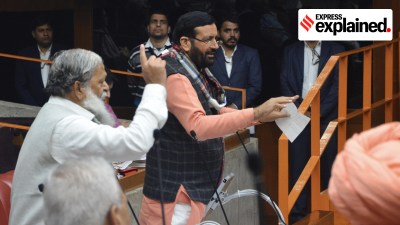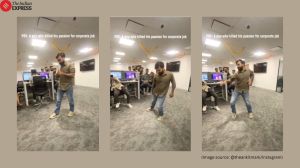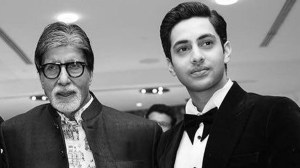Ayodhya ruling tomorrow
Judges must give ruling,not worry of consequences,says senior advocate Soli Sorabjee.
Noting that the call for reconciliation had come 50 years too late,the Supreme Court today dismissed a plea to defer the verdict in the Ram Janmabhoomi-Babri Masjid title suits and cleared the way for the Allahabad High Court to pronounce its judgment.
The Lucknow Bench of the High Court is now free to deliver the verdict any time before or on October 1 when Justice D V Sharma,one of the three judges on the Bench which heard the case,retires.
Just 24 hours before the High Court was to pronounce the judgment on September 24,petitioner Ramesh Chandra Tripathi got a divided Supreme Court Bench to stay the verdict to initiate last-minute settlement talks. He had cited apprehension of communal tension in the aftermath of the judgment.
It was at this juncture of indecision in the apex court that Chief Justice of India S H Kapadia decided to hear Tripathis petition today at the head of a three-judge Bench comprising Justices Aftab Alam and K S Radhakrishnan.
At 2 pm,after a half-day-long hearing,the Bench dismissed Tripathis petition without offering reasons. The order in a single paragraph put an end to the uncertainty.
Having considered detailed arguments,we are of the view that the special leave petition of Tripathi is to be dismissed. It stands dismissed, the court said.
The decision may be a result of submissions made by Attorney General G E Vahanvati,called forth to assist the court,that the government does not want the uncertainty to continue as the law and order machinery cannot sustain this state of continued animation.
It may also be the outcome of the words of senior advocate Soli Sorabjee who said judges have to deliver judgments according to facts,law and conscience,they shall not worry of the consequences. Then again,the arguments by various plaintiffs,including Sunni Central Board of Waqf and Hindu Mahasabha and with the exception of original plaintiff Nirmohi Akhara,who strongly supported the pronouncement of the judgment and considered Tripathi an alarmist.
The day started with Tripathis lawyer Mukul Rohatgi warding off criticism of his client being a non-serious player who never attended court hearings. He is 73 years old. An old man who lives near Ayodhya. He could not travel 120 km to attend court every day, he said.
Alleging that the Babri Masjid demolition in 1992 led to the Bombay serial blasts,Rohatgi said reconciliation was a better option but his client needed time to bring hardened litigants together.
A judgment,he said,would see one of the parties coming to the Supreme Court in appeal,only to remain here for long years. The High Court should have also tried for settlement rather than saying you litigants talk and then come to us, he argued.
He blamed the Centre for meekly sitting through the prolonged litigation despite its powers under the Acquisition of Certain Area at Ayodhya Act,1993 in which land would be vested with the government to propose building a temple,a mosque,tourist amenities and other public utilities like a library.
The government was on a secular path in 1993,providing for both communities to co-exist. Why has the Central government kept quiet all these years? A proactive stand was necessary from this government, he said.
Rohatgi argued it was wrong on the part of the Supreme Courts Constitution Bench,in a majority judgment in 1994 on a Special Reference from the President,to construe that the Act only gave the government powers of limited vesting,that is,the authority of a Statutory Receiver to manage the disputed land until the High Court decided the title suits. If the 1993 Act provided the government powers,why did it keep quiet? he asked.
To this,Justice Alam said: Why were you quiet all these years?
Rohatgi responded by saying how much can one man do? And now I am running against time.
You are running against time because you woke up late,50 years late, Justice Alam said.
But My Lord,a stitch in time saves nine. Consider me now, Rohatgi answered.
He said Justice Sharmas retirement was hardly an impediment as under Order 20 Rule 2 of the Civil Procedure Code,a judge can pronounce a judgment written by his predecessor. He said if mediations are conducted under the government or the court,the present judgment can be placed in a sealed cover and read out once the talks fail. In extraordinary situations,the courts have also innovated, he argued.
The Nirmohi Akhara said it was against indefinite continuation of the litigation but favoured a time-bound deferment. It said Justice Sharmas tenure could be extended by six months or a year. It even agreed to start talks with the Waqf Board,the other title contender.
Senior advocate Anoop Chaudhary for the Waqf Board said Tripathi had got it wrong when he said the 1992 demolition was connected to the Bombay blasts.
Senior advocate Ravi Shanker Prasad,appearing for Dharam Dass,said let the court decide the suits and then the Centre will see that the order is followed. The old man came to the Supreme Court,though at the last moment, he pitched in.
Sorabjee,appearing for All India Muslim Personal Law Board,said: We are 100 per cent for settlement,we are 100 per cent against the delay of judgment. What is this settlement,what are the terms there should be some degree of realism.
The possibility of a lunatic fringe fomenting trouble does not mean that the judiciary should be held at ransom. It is the Games now,later it will be Obamas visit, Sorabjee said.
Vahanvati countered Rohatgis version that the government was meekly sitting all these years. He said the government was bound by the Rule of Law,by the 1994 Supreme Court decision that it should don the role of a Receiver.
In 2010,Mr Tripathi wakes up to say that the 1994 decision is wrong. The Central government did not sit meekly,I repeat,meekly,and appoint a Receiver. What else is the government supposed to do but respect the Rule of Law? he said.
Calling Tripathis suggestion for an extension in service of Justice Sharma as incredible,he said it was not up to the government to decide this issue but the Chief Justice of the High Court concerned or later the Supreme Court Collegium.
So far settlement has not taken place,but we do not want the uncertainty that is here today to continue. The law and order machinery cannot sustain this state of continued animation for so long, the AG spoke for the government.
- 01
- 02
- 03
- 04
- 05































